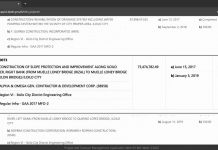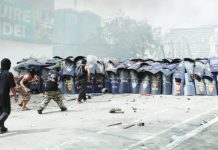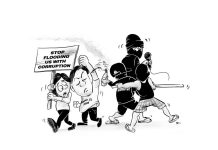
[av_one_full first min_height=” vertical_alignment=” space=” custom_margin=” margin=’0px’ padding=’0px’ border=” border_color=” radius=’0px’ background_color=” src=” background_position=’top left’ background_repeat=’no-repeat’ animation=”]
[av_heading heading=’ ABOVE THE LAW ‘ tag=’h3′ style=’blockquote modern-quote’ size=’30’ subheading_active=’subheading_below’ subheading_size=’15’ padding=’10’ color=” custom_font=”]
BY AYIN DREAM D. APLASCA
[/av_heading]
[av_textblock size=” font_color=” color=”]
Thursday, October 5, 2017
[/av_textblock]
[av_textblock size=’18’ font_color=” color=”]
IT’S ALL over the news.
The House of Representatives’ committee on ways and means recommended that Congress grant the President emergency powers to immediately take over the operations of the Bureau of Customs (BoC).
There is endemic corruption in the said office. The latest was the alleged shipment of almost P7-billion worth of shabu.
The purpose of the Committee was to let the President take over the operations of the Bureau to ensure public safety and security. However, the emergency power should be studied carefully. Why? It’s because it may include the privatization of certain departments or functions within the present Bureau.
This is a little bit complicated. This is one of the cases where the emergency power of the President is raised as a special concern. But what is emergency power?
In general, it means there is a condition that suddenly intensifies the degree of existing danger to life or other things which is beyond normal. It could refer to the economic status of the state, the natural disaster experienced by citizens, and danger to national security.
Emergency power requires a delegation from Congress. The 1987 Philippine Constitution grants this under Section 23 (2), Article VI. It states that: “(1) The Congress, by a vote of two-thirds of both Houses in joint session assembled, voting separately, shall have the sole power to declare the existence of a state of war. (2) In times of war or other national emergency, the Congress may, by law, authorize the President, for a limited period and subject to such restrictions as it may prescribe, to exercise powers necessary and proper to carry out a declared national policy. Unless sooner withdrawn by resolution of the Congress, such powers shall cease upon the next adjournment thereof.”
Of course, there are certain factors or conditions that Congress should consider in granting emergency powers. First, there must be war or other emergency. Second, the delegation must be for a limited period only. Third, the delegation must be subject to such restrictions as the Congress may prescribe. Lastly, the emergency powers must be exercised to carry out a national policy declared by Congress.
Nonetheless, this power would allow the President to do everything and anything. But the Congress still has the power to put limits on this power. In the present case of the BoC, let’s see if this time the emergency power will be granted considering all the factors I discussed.
We should always remember that our government has three branches: executive, legislative and judiciary. Each is supreme within its own sphere. There is no monopoly of powers. Rather, the Constitution demands that we should put faith in the wisdom of the President but, at the same time, limits his power for procedural limitations.
(Atty. Ayin Dream D. Aplasca practices her profession in Iloilo City. She may be reached thru ayindream.aplasca@gmail.com/PN)
[/av_textblock]
[/av_one_full]







